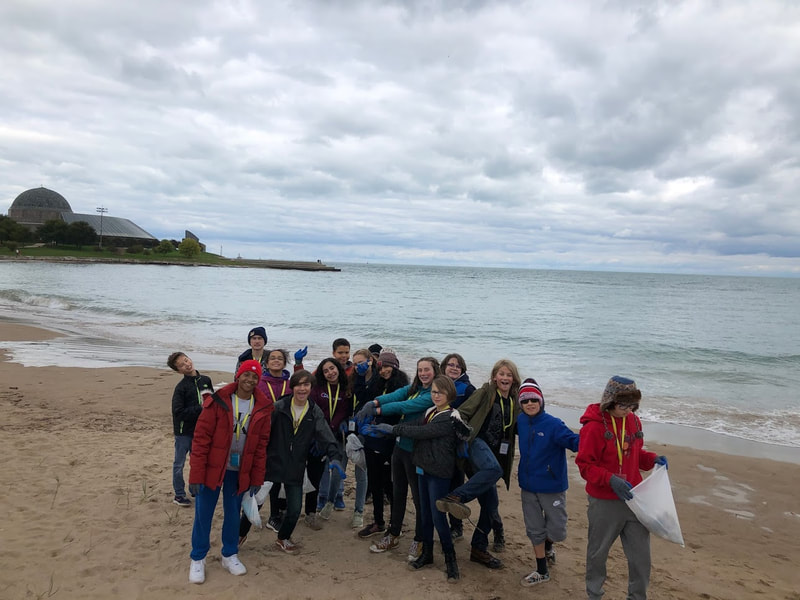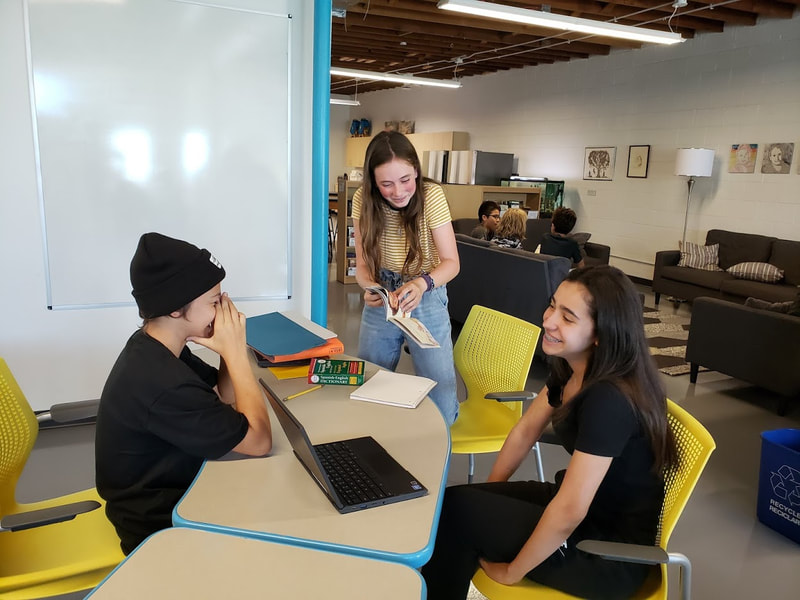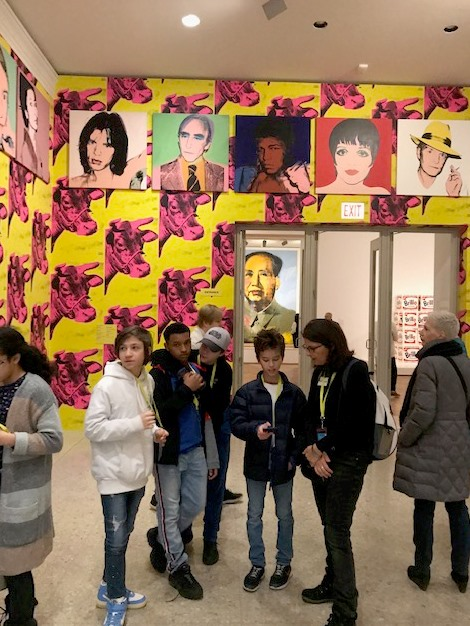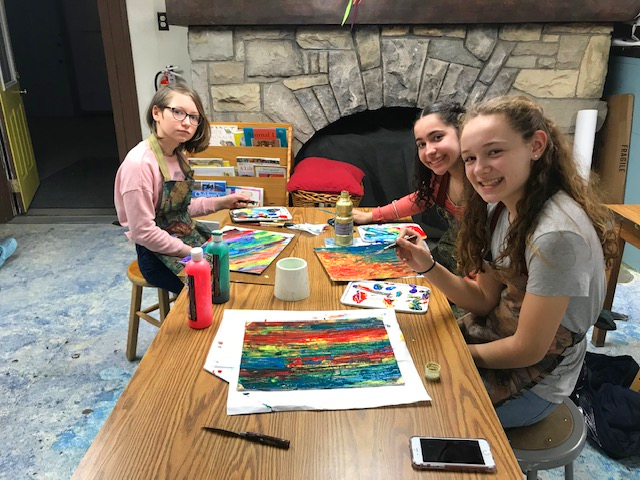Middle School (Ages 12 to 14)
To foster intellectual growth, social and emotional well-being, and the cultivation of the human spirit and individual identity within our adolescents as they prepare themselves for adult life." - Mission of Alcuin Montessori Adolescent Program
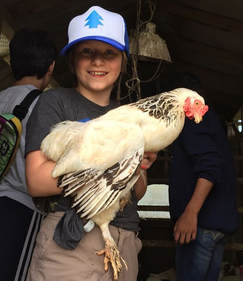
Third Plane of Development: I Can Stand on My Own.
Adolescents are in a sensitive period for developing their personal identity. They are separating from their parents and attempting to figure out who they are going to be as an individual. They are observing the people around them and trying on different personas and are looking for their role in the community and need to be appreciated for their unique contributions. They are modeling their understanding of adulthood on the adults around them, including teachers, parents, and other mentors.
During this stage of development, our students:
Adolescents are in a sensitive period for developing their personal identity. They are separating from their parents and attempting to figure out who they are going to be as an individual. They are observing the people around them and trying on different personas and are looking for their role in the community and need to be appreciated for their unique contributions. They are modeling their understanding of adulthood on the adults around them, including teachers, parents, and other mentors.
During this stage of development, our students:
- Are learning key communication skills;
- Are developing a more mature and complex understanding of social interactions;
- Crave creative and physical outlets, especially for processing complex emotional and psychological issues.
- Crave personal space, but they are also highly social.
- Still need to move on a regular basis, and being physically engaged in work that produces tangible results is rewarding to them.
- Need to understand the economic systems of our world and have a sense of what earning and spending money really means.
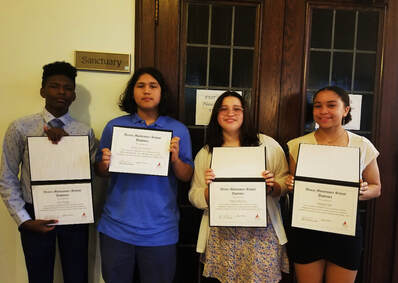
What makes our program unique?
What makes our program so unique is that it incorporates both Montessori philosophy and current “best practices”. It is also designed to transition students from the Montessori classroom to a traditional high school setting.
We are fully committed to mentoring and coaching students through a sometimes complicated and confusing time in their lives:
What makes our program so unique is that it incorporates both Montessori philosophy and current “best practices”. It is also designed to transition students from the Montessori classroom to a traditional high school setting.
- We emphasize independent, project-based, and student-driven work;
- We encourage students to do high-level critical thinking and to consider themes and issues across all areas of curriculum;
- We give daily and weekly homework in addition to student-managed long-term projects (we aim for an average of 1-1.5 hours a night);
- We introduce formal lectures along with interactive presentations, dynamic activities, student-led research, group projects, and more;
- We utilize quizzes and tests, as well as alternative forms of assessment and informal observation.
We are fully committed to mentoring and coaching students through a sometimes complicated and confusing time in their lives:
- We facilitate appropriate, effective communication and problem-solving skills through one-on-one, small group, and large group interactions;
- We work with students to balance their school and home lives, helping to plan homework around family time and extracurricular activities;
- We constantly observe students’ physical, emotional, and academic needs and adapt our teaching to fit each child.
The Alcuin Montessori Middle School Adolescent Program engages students in learning about and through all areas of life (not just textbooks).
We are fully committed to mentoring and coaching students through a sometimes complicated and confusing time in their lives:
- We incorporate real-world applications of studied concepts
- We discuss current events and their implications on all spheres of life
- We contribute to our school and local communities with monthly volunteering and service projects
- We take weekly trips into the Oak Park and Chicagoland area to facilitate curriculum enhancement, community engagement, and authentic orienteering and practical life experiences.
We are fully committed to mentoring and coaching students through a sometimes complicated and confusing time in their lives:
- We facilitate appropriate, effective communication and problem-solving skills through one-on-one, small group, and large group interactions
- We work with students to balance their school and home lives, helping to plan homework around family time and extracurricular activities
- We constantly observe students’ physical, emotional, and academic needs and adapt our teaching to fit each child.
It is the education of adolescents that is important, because adolescence is the time when the child enters in the state of adulthood and becomes a member of society.” - Maria Montessori
Special Features
Two-Year Cycle of Curriculum
Curriculum: Language Arts
Reading is based on a book group and seminar format. Students alternate between reading books as a class and selecting independent books. We use reading workshop materials to teach reading at the middle school level. Students learn to pace their own reading, monitor their comprehension, and reflect on various elements in the text to understand the author’s purpose. Within the workshop format, we also choose books to connect with our social studies units of study.
Each week students also participate in a seminar discussion. The focus of the seminar is divergent thinking. Students learn to question or comment using direct text content or by comments related to other participants' shared thinking. Seminar encourages participants to closely listen to their peers, think critically, and clearly articulate their thoughts. In doing so, the goal is to develop a deeper understanding of the ideas within the text.
Writing is done through a workshop model where students receive frequent skill-based lessons, engage in writing-partner relationships, and utilize in-class writing time to work on their process and conference with the teacher. Each unit ends with a celebration of student work and publication via various formats. The Language curriculum is further supplemented with a weekly word study for 7th graders and a writing mechanics study for 8th graders.
Curriculum: Math
It is the inherent tendency of the child to observe, classify, order, and establish relationships that instinctively leads to the use of math. Dr. Montessori believed the “Mathematical Mind” is within every person.
Alcuin has a hands-on, individualized math program highly integrated with science in which students have the opportunity to create real-world project connections to research, investigate, and share with their teachers and peers. Our math program focuses on developing a “growth” mindset for mathematical learning, where students view math not as a series of procedures and fixed steps to memorize, but as a creative and multi-dimensional process used to solve real-world problems. Students in our program typically are at a point in their development where they are learning concepts in arithmetic, prealgebra, algebra I, and geometry. Defining features of our math program are that we:
The more we establish relationships between math and science, the more we increase student knowledge, interest, and confidence in the material. Students in our program typically are at a point in their development where they are learning concepts in prealgebra, algebra I, or geometry. The goal is for each student to complete algebra I work by the end of the 8th grade year and to enter high school with confidence in their math abilities.
Curriculum: Science
Our science work spans topics in the physical and biological sciences, from physics and chemistry to biology and earth and environmental science. We also integrate engineering practices and design into projects. At this age it is important to avoid teaching a “mile wide and an inch deep” so that the adolescent has the opportunity to make deeper connections to the natural world, interconnections between subject areas, and to have meaningful experiences using the technology that is the result of our history of discovery.
Curriculum: Social Studies
Social studies introduces students to defining moments in the history of humanity, patterns of human behavior and the interactions between cultures, along with human progress and the building up of civilization. Units are based upon answering several open-ended essential questions and include lessons from the teacher, small group projects, homework, quizzes and/or tests, and an independent research project. As a supplement, students also work independently on geographical explorations and cultural literacy materials.
- Units are theme-based and center around several core questions that transcend the different classes, creating an interconnectedness and inter-disciplinary context to our studies.
- The two-year sequence document provides a more specific breakdown of the themes and units of study as they align to the educational syllabus.
Curriculum: Language Arts
Reading is based on a book group and seminar format. Students alternate between reading books as a class and selecting independent books. We use reading workshop materials to teach reading at the middle school level. Students learn to pace their own reading, monitor their comprehension, and reflect on various elements in the text to understand the author’s purpose. Within the workshop format, we also choose books to connect with our social studies units of study.
Each week students also participate in a seminar discussion. The focus of the seminar is divergent thinking. Students learn to question or comment using direct text content or by comments related to other participants' shared thinking. Seminar encourages participants to closely listen to their peers, think critically, and clearly articulate their thoughts. In doing so, the goal is to develop a deeper understanding of the ideas within the text.
Writing is done through a workshop model where students receive frequent skill-based lessons, engage in writing-partner relationships, and utilize in-class writing time to work on their process and conference with the teacher. Each unit ends with a celebration of student work and publication via various formats. The Language curriculum is further supplemented with a weekly word study for 7th graders and a writing mechanics study for 8th graders.
Curriculum: Math
It is the inherent tendency of the child to observe, classify, order, and establish relationships that instinctively leads to the use of math. Dr. Montessori believed the “Mathematical Mind” is within every person.
Alcuin has a hands-on, individualized math program highly integrated with science in which students have the opportunity to create real-world project connections to research, investigate, and share with their teachers and peers. Our math program focuses on developing a “growth” mindset for mathematical learning, where students view math not as a series of procedures and fixed steps to memorize, but as a creative and multi-dimensional process used to solve real-world problems. Students in our program typically are at a point in their development where they are learning concepts in arithmetic, prealgebra, algebra I, and geometry. Defining features of our math program are that we:
- Establish an environment that allows students to safely make mistakes;
- Allow for moments of learning at an individualized pace;
- Provide works and opportunities that support the developmental need for both individual work time and the need to work within groups;
- Ask that students analyze the strengths and weaknesses of their work and the work of others in a group setting;
- Use materials and instructional strategies from sources such as the Mathematics Assessment Project, The Math Institute by Montessorian Michael Waski, Youcubed.org, DESMOS and Dan Meyer’s 3-ACTS. We incorporate real-world applications of studied concepts.
The more we establish relationships between math and science, the more we increase student knowledge, interest, and confidence in the material. Students in our program typically are at a point in their development where they are learning concepts in prealgebra, algebra I, or geometry. The goal is for each student to complete algebra I work by the end of the 8th grade year and to enter high school with confidence in their math abilities.
Curriculum: Science
Our science work spans topics in the physical and biological sciences, from physics and chemistry to biology and earth and environmental science. We also integrate engineering practices and design into projects. At this age it is important to avoid teaching a “mile wide and an inch deep” so that the adolescent has the opportunity to make deeper connections to the natural world, interconnections between subject areas, and to have meaningful experiences using the technology that is the result of our history of discovery.
Curriculum: Social Studies
Social studies introduces students to defining moments in the history of humanity, patterns of human behavior and the interactions between cultures, along with human progress and the building up of civilization. Units are based upon answering several open-ended essential questions and include lessons from the teacher, small group projects, homework, quizzes and/or tests, and an independent research project. As a supplement, students also work independently on geographical explorations and cultural literacy materials.
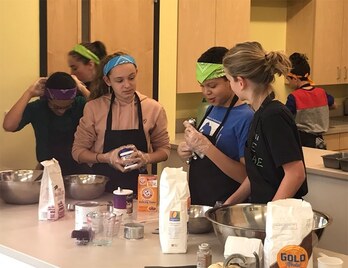
Curriculum: Erdkinder/Microeconomics
Maria Montessori recommended that the adolescent should spend a period of time in the country away from the environment of the family. This would provide an opportunity to study civilization through its origin in agriculture. Montessori outlined a general plan for their studies and work but believed that the program, she called Erdkinder, could only be developed from experience. In an urban school like ours, this work is carried out through gardening and projects within a land space or community garden. We have an established microeconomy business and a small piece of land that works in conjunction with our food production. For the adolescent and for all of us, growing your own food is powerful. To grow it and then share or sell it some way is Montessori’s vision for our 7th and 8th grade students.
Maria Montessori believed strongly that adolescents need to have a working knowledge of money and economic systems, to discover their work has value to the world around them, and to connect the work of the hands and head. In Microeconomy students gain knowledge about basic economics concepts, work together to conceptualize a business of their own choosing, develop a comprehensive business plan, have frequent meetings to divide labor and time, and finally put their plan into action. Students develop accounting, production, marketing, and communication skills as they work together to start and run their small business.
Our middle school students have created a student-led business, The Bee’s Knees Bakehouse. They bake bread weekly for the Alcuin community and grow their own herbs and vegetables used in the recipes. Their mission: To educate ourselves on how to organize and run a successful business, to learn
everyday skills so we can apply them to future jobs, and to teach younger students about our bread, the environment, and how we are all connected.
Curriculum: Spanish Language
World language instruction guides students to acquire language in a natural way---beginning with listening, followed by comprehension and speech, then reading, and finally writing. Through the use of a multi-faceted curriculum, internalized vocabulary quickly evolves into a deeper understanding of the target language, leading to practical applications such as conversation, written communication, role-play exercises, visual representation, etc. Alcuin’s Spanish language program also includes the exploration of traditional and societal dimensions of the Hispanic/Latin-American culture through practical life experiences, such as writing culturally relevant research papers and taking field trips, both within the United States and abroad.
Maria Montessori recommended that the adolescent should spend a period of time in the country away from the environment of the family. This would provide an opportunity to study civilization through its origin in agriculture. Montessori outlined a general plan for their studies and work but believed that the program, she called Erdkinder, could only be developed from experience. In an urban school like ours, this work is carried out through gardening and projects within a land space or community garden. We have an established microeconomy business and a small piece of land that works in conjunction with our food production. For the adolescent and for all of us, growing your own food is powerful. To grow it and then share or sell it some way is Montessori’s vision for our 7th and 8th grade students.
Maria Montessori believed strongly that adolescents need to have a working knowledge of money and economic systems, to discover their work has value to the world around them, and to connect the work of the hands and head. In Microeconomy students gain knowledge about basic economics concepts, work together to conceptualize a business of their own choosing, develop a comprehensive business plan, have frequent meetings to divide labor and time, and finally put their plan into action. Students develop accounting, production, marketing, and communication skills as they work together to start and run their small business.
Our middle school students have created a student-led business, The Bee’s Knees Bakehouse. They bake bread weekly for the Alcuin community and grow their own herbs and vegetables used in the recipes. Their mission: To educate ourselves on how to organize and run a successful business, to learn
everyday skills so we can apply them to future jobs, and to teach younger students about our bread, the environment, and how we are all connected.
Curriculum: Spanish Language
World language instruction guides students to acquire language in a natural way---beginning with listening, followed by comprehension and speech, then reading, and finally writing. Through the use of a multi-faceted curriculum, internalized vocabulary quickly evolves into a deeper understanding of the target language, leading to practical applications such as conversation, written communication, role-play exercises, visual representation, etc. Alcuin’s Spanish language program also includes the exploration of traditional and societal dimensions of the Hispanic/Latin-American culture through practical life experiences, such as writing culturally relevant research papers and taking field trips, both within the United States and abroad.
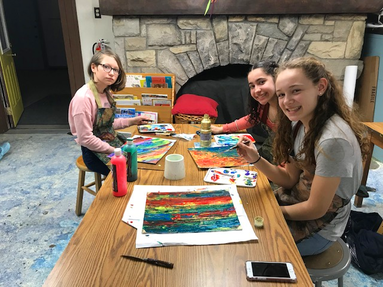
Curriculum: Arts Program
These enrichment classes allow for moments of genuine creative self-expression. Students receive instruction from specialists who create opportunities for our students to remain active, engaged, and free to express themselves. In the past students have had opportunities to visit art studios to learn techniques from professionals and they have worked with our elementary age students developing scripts for the opera.
Curriculum: Physical Education
In physical education students work together in teams to achieve goals and compete with each other while staying in motion and providing a way for the students to have an outlet for their physical energies. When the weather is warmer we gather in Maple Park, a large public open space in Oak Park. During the colder months we use our Roosevelt space for health and wellness classes indoors.
These enrichment classes allow for moments of genuine creative self-expression. Students receive instruction from specialists who create opportunities for our students to remain active, engaged, and free to express themselves. In the past students have had opportunities to visit art studios to learn techniques from professionals and they have worked with our elementary age students developing scripts for the opera.
Curriculum: Physical Education
In physical education students work together in teams to achieve goals and compete with each other while staying in motion and providing a way for the students to have an outlet for their physical energies. When the weather is warmer we gather in Maple Park, a large public open space in Oak Park. During the colder months we use our Roosevelt space for health and wellness classes indoors.
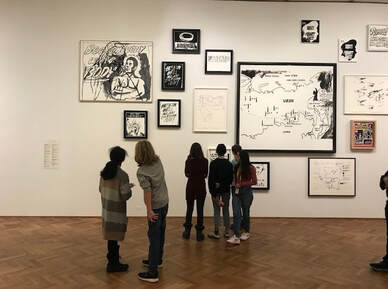
Curriculum: Beyond the Classroom Walls
This component of our program extends students’ learning “beyond the classroom walls” into neighboring communities. We dedicate time nearly every week to leave the school for a trip into Oak Park, the neighboring suburbs, or Chicago. These trips encourage independence, confidence in orienteering and navigation, and supplement and reinforce existing projects and activities.
Examples of Beyond the Classroom Walls trips:
This component of our program extends students’ learning “beyond the classroom walls” into neighboring communities. We dedicate time nearly every week to leave the school for a trip into Oak Park, the neighboring suburbs, or Chicago. These trips encourage independence, confidence in orienteering and navigation, and supplement and reinforce existing projects and activities.
Examples of Beyond the Classroom Walls trips:
- Volunteering locally, such as at the nearby food pantry and senior citizen recreation center.
- Viewing performances at theaters followed by Q&A sessions with directors and actors.
- Walking tours of ethnic neighborhoods.
- Studying authentic works and artifacts at museums of science, culture, and art.
- Visiting a local foster home for children to donate toys made by our students in a local woodworking studio.
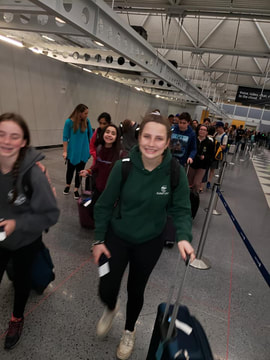
Traveling in the U.S. and Abroad
Adolescents are primed and ready for experiences that broaden their worldview and challenge their limits. We nurture this need with two extended trips each year, a multi-day community-building trip in the fall and a week-long trip for a historical exploration trip in the spring. These extended trips are an incredible opportunity to learn about our history, culture, geography, to teach each other lessons through student-led workshops, and to build trust within the community.
Adolescents are primed and ready for experiences that broaden their worldview and challenge their limits. We nurture this need with two extended trips each year, a multi-day community-building trip in the fall and a week-long trip for a historical exploration trip in the spring. These extended trips are an incredible opportunity to learn about our history, culture, geography, to teach each other lessons through student-led workshops, and to build trust within the community.
- For our fall trip we currently take a five-day to The Country Experience. The Country Experience is a prepared farm environment where children experience life and learn about themselves, their abilities, and their place in the world.
- Our spring trip alternates between domestic travel to Washington, D.C. and New York and international travel to Costa Rica. In Costa Rica we attend foreign language classes at The Costa Rican Language Academy in San Jose, take ecologically focused trips into the rain forests and local ecosystems, and we stay with host families. These experiences cannot be replicated back home and they allow the students to acquire an appreciation for other cultures, to practice their grace and courtesy, apply their world language skills, and connect them directly to the history of humanity.
In the soul of the adolescent, great values are hidden, and in the minds of these boys and girls lies all of our hope for future progress.” - Maria Montessori


